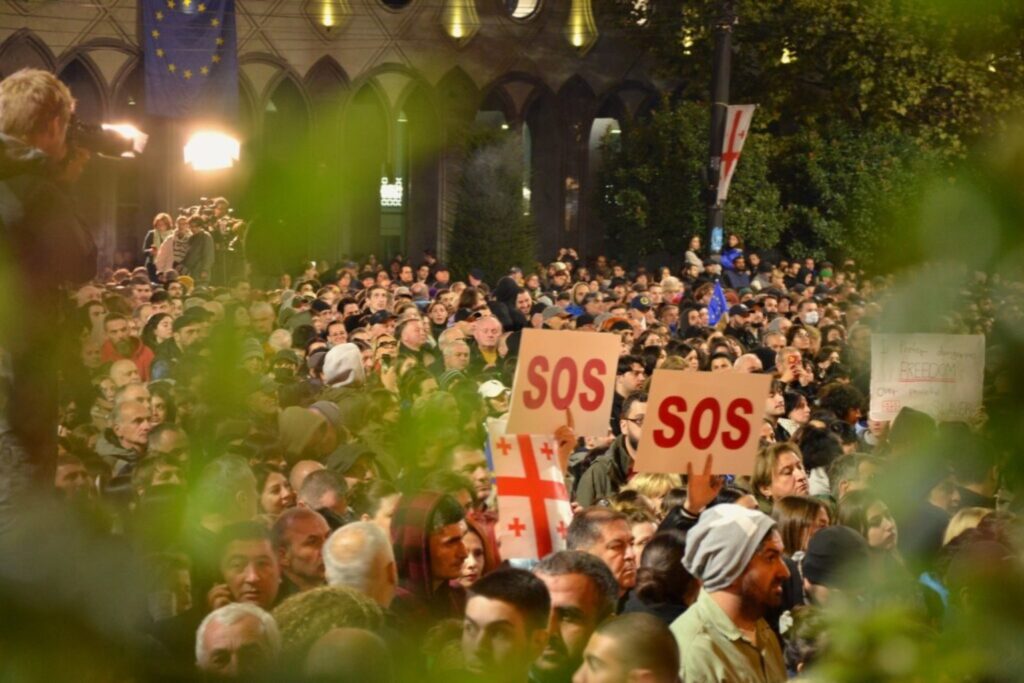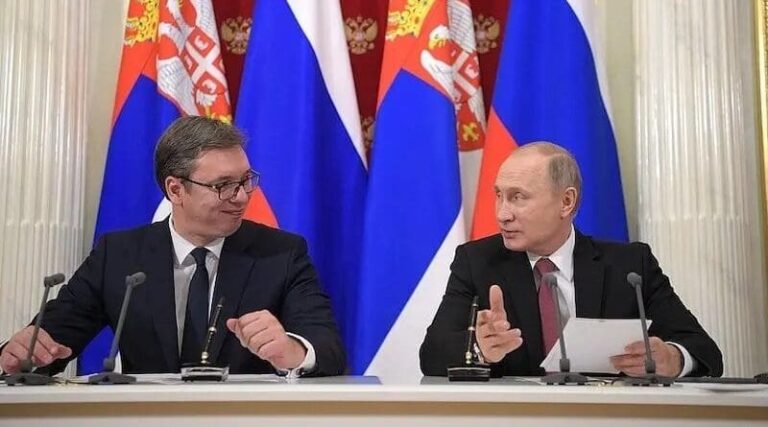There are signs of yet another crisis the EU has to deal with after the parliamentary election in Georgia on 27 October. The pro-Russian party Georgian Dream has allegedly won 54% of the vote. This puts an end to hopes about the formation of a coalition supporting Georgia’s future membership in the EU. OSCE observers, the current Georgian President, and the opposition claim that the election results have been rigged. Georgian President Salome Zourabichvili called for protests in the aftermath of the contested parliamentary election on 27 October 2024. President Zourabichvili and the opposition to Georgian Dream, do not accept the party’s alleged victory. She argued that the elections were the result of a “Russian special operation”. About four days later, Harris X, a global market research and data analytics company, argued that the election results were statistically impossible due to discrepancies by the Central Election Committee, which showed an excess of 8% of all votes cast.
Leading Georgia’s ruling party Georgian Dream is Bidzina Ivanishvili, a billionaire with an estimated wealth of $7.5bn, who gained his wealth in Russia in the 1990s. His wealth makes him one of the two hundred richest men in the world. After the demise of the Soviet Union, he held posts in finance, the metal industry, as well as in telecommunication. After his return to Georgia, there were rumours that people did not know what the men, who owned zebras, penguins and a chateau in the hills of Tbilisi, looked like. Despite lacking a track record as an experienced politician, Bidzina Ivanishvili founded the political alliance Georgian Dream in 2012. The party consisted of about six parties with slightly different political ideologies which ranged from nationalists to more pro-Western liberalists. On 1 October 2012, Georgian Dream claimed victory over the United National Movement, the party by former President Mikheil Saakashvili. This victory challenged the outgoing government’s continued ambitions for closer alignment with NATO and the EU. However, in June 2014, the EU and Georgia signed an Association Agreement with the EU resulting in preferential trade. The victory of Georgian Dream is a step back from Georgia’s closer integration with the EU and NATO and a step towards Georgia’s alignment with Russia.
After the Georgian Dream’s electoral victory in 2012, Ivanishvili’s priority was on seeking to “normalise” relations with Russia. In the aftermath of this election, Ivanishvili stated that “restoring relations with the Kremlin is one of our main tasks.” Cooperation between Russia and Georgia was required to resolve the issue over Georgia’s breakaway regions South Ossetia and Abkhazia. These two regions were at the core of the Russian-Georgian war in August 2008. Since then, security policy in the Caucasus remains a priority.
There is a discrepancy between the Georgian Dream’s ambition for closer ties with Russia and the will of Georgians. Three-quarters of the Georgian population see Georgia’s political future aligned with the West, instead of with Russia. Political developments in Georgia in the summer of 2024 evidence Georgian Dreams support for future alignment with Russian policies. In May and June 2024, Bidzina Ivanishvili supported the imposition of the foreign agent law in Georgia, which is in line with the Kremlin’s increasing signs of curtailing democracy in Russia since President Putin’s second term in the mid-2000s. These protests were over a controversial ‘foreign agent law.’ Such a law has also been implemented in Russia in 2012 restricting the work of NGOs in Russia, such as Alexey Navalny’s organisation, which spearheaded the political opposition movement against President Putin. On the one hand, the foreign agent law undermines Georgia’s path towards a democracy which might eventually meet the criteria for membership in the EU and NATO. On the other hand, this law, and the alleged victory of Georgian Dream fulfils President Putin’s ambition to maintain tight control over Georgia in his continuing battle against Western liberal democracy.
Ivanishvili’s anti-Western rhetoric is strong. In a speech delivered in April 2024 argued that between 2004 and 2012 Georgia was governed by “a foreign-appointed revolutionary committee.” His statement alludes to the aftermath of pro-Western revolutions in Georgia in 2003 following rigged parliamentary elections and the EU’s and the US’ subsequent support of pro-democratic movements in Georgia. He goes as far as blaming NGOs for having sparked conflict in Ukraine and beyond. He argued that “the important decisions in this world are taken by the global party of war. It is this global force that first forced the confrontation of Georgia with Russia and then put Ukraine in even worse peril. NGOs and radical opposition are acting on their behalf. The laws that we are proposing are there to expose those dark linkages.” In light of his view on NGOs, it comes as no surprise that he facilitated the introduction of foreign agent law in Georgia.
His political views could be considered as portraying elements of populism. He ends this speech by stating that “a free, independent, and sovereign Georgia, a member of the European Union, a united and whole Georgia – this is our Georgian dream, which we will achieve together.” This statement aims to address to the majority of Georgia’s population, who aspire for a democratic Georgia to become an EU member state rather than remain in the shadow of President Putin’s influence.
It is now up to the Georgian people and the EU to take the next step in re-consolidating democracy in Georgia. In a post on X on 27 October President Zourabichvili “urged our international partners to protect Georgia by standing with the people, not with an illegitimate government. Just as you opposed the Russian law, we ask you to stand with us again.” Charles Michel, President of the European Council posted on X that the election results in Georgia were added to informal talks at the upcoming European Political Community Meeting on 7 November 2024. This meeting, he stated, “will set the next steps in the [EU’s] relations with Georgia.” As of the moment, leaders of the political opposition are planning a protest in Georgia’s capital Tbilisi. Since 4 November 2024, several thousand protesters went on the streets in Tbilisi to stand up in protest against this rigged election. The next days and next week will show how much the Georgian people stand up to fight for democracy and how much support the EU can provide at a time of Russia’s continuing war in Ukraine and the crisis in the Middle East.
Bibliography
Civil Georgia. 29 April 2024. Bidzina Ivanishvili Backs Anti-Western Policies, Threatens Repressions – Civil Georgia
Delegation of the European Union to Georgia. 13 September 2016. EU/Georgia Association Agreement | EEAS
Harris. BREAKING: HarrisX Releases Final Georgia 2024 Exit Poll Analysis https://www.harrisx.com/posts/harrisx-releases-final-georgia-2024-exit-poll-analysis
Jonathan Steele. 16 February 2024. Alexei Navalny obituary | Russia | The Guardian
Light, F. (2024). Reuters. 28 October 2024. Georgian president accuses ruling party of using Russian ‘methodology’ in disputed vote | Reuters
Light, F. (2024). Reuters. Georgian opposition stages new protest over election result. 4 November 2024. https://www.reuters.com/world/europe/georgian-opposition-stages-new-protest-over-election-result-2024-11-04/
Maass, Anna-Sophie (2017) EU-Russia Relations, 1999-2015: From Courtship to Confrontation – 1st London and New York: Routledge.
Politico. 28 May 2024. Georgia’s EU dream in tatters as ‘foreign agent’ bill becomes law – POLITICO
Shaun Walker. The Guardian. 2013. Georgia’s billionaire PM wants to give up office, but will he relinquish power?
The Guardian. 2024. https://www.theguardian.com/world/2024/oct/27/georgia-election-calls-for-protests-as-ruling-pro-russia-party-declared-winner
Tass. Russian News Agency. 2023. 23 April 2013. Georgia’s PM Ivanishvili urges gradual normalization of relations with Russia – Russia – TASS
X Account by President Salome Zourabichvili (@Zourabichvili_S) / X. 28 October 2024.




